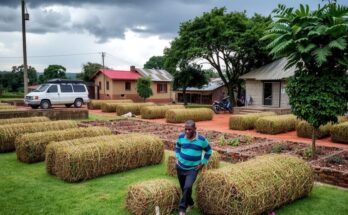The Commonwealth Summit in Samoa convened to address climate change and reparations for slavery, with leaders emphasizing urgent climate action necessary for vulnerable nations while discussing the contentious issue of historical reparations amid differing perspectives from member states.
The recent Commonwealth Heads of Government Meeting (CHOGM) convened in Samoa, focusing on critical issues such as climate change and the potential for reparations linked to Britain’s historical role in transatlantic slavery. King Charles, as the head of the Commonwealth, participated alongside leaders from 56 nations with historical ties to the British Empire. Notably, many member states are small nations and vulnerable island territories facing severe consequences of climate change, including rising sea levels. Minister Maina Vakafua Talia from Tuvalu emphasized the urgency of adhering to the goals of the Paris Accord, expressing concerns that new fossil fuel initiatives pose detrimental risks to island nations. Talia stated, “We call on our wealthier partners to align themselves with this goal and not fan the flames of the climate crisis with fossil fuel expansion.” Australian Foreign Minister Penny Wong highlighted that climate change represents both a national security and economic threat for Pacific communities and Commonwealth countries. The summit witnessed Samoan leaders addressing the direct impacts of climate phenomena, with attention drawn to the alarming rates at which ocean temperatures in the Pacific are increasing. In addition to environmental discussions, the topic of reparations for historical injustices related to slavery also surfaced. Although British Prime Minister Keir Starmer indicated that the UK would not formally pursue discussions on reparations at this summit, several Caribbean nations, through the Caribbean Community (CARICOM) and the African Union, are pushing for dialogue on this matter. Starmer advocated a forward-looking approach but was met with the demand for acknowledgment of the past. Eric Phillips from CARICOM’s reparations commission conveyed discontent with Starmer’s stance, questioning the relevance of the Commonwealth under such an attitude. Meanwhile, discussions regarding reparations were reportedly ongoing behind closed doors. As the summit progressed, participants underscored the historical context, emphasizing that from the 15th to 19th centuries, over 12.5 million Africans were forcibly taken and enslaved, with the legacy of that suffering still present today.
The Commonwealth of Nations is a political association primarily consisting of countries that were formerly part of the British Empire. The annual Commonwealth Heads of Government Meeting serves as a platform for leaders to engage in dialogue on pressing issues affecting their nations. This year’s summit in Samoa is particularly significant due to the urgent challenges posed by climate change, particularly for small island states that are disproportionately affected by global warming and rising sea levels. In parallel, discussions on reparations for the historical injustices of slavery reflect an evolving narrative around colonial accountability and racial equality. The mention of the Caribbean Community (CARICOM) signifies a collective effort to address these historical grievances and seek dialogue with former colonial powers on reparative justice.
The Commonwealth Summit in Samoa addressed two monumental issues: the existential threat of climate change and the potential for reparations for historical injustices stemming from transatlantic slavery. While discussions centered on the necessity of climate action for vulnerable island nations, the dialogue around reparations revealed a complex and contentious aspect of the summit. Although the UK government refrained from committing to reparations, the call for dialogue signifies a growing recognition of the need to confront historical wrongs and their ongoing ramifications. The outcomes from this summit may have lasting implications for Commonwealth relations as member nations strive for justice and sustainability.
Original Source: stratnewsglobal.com




